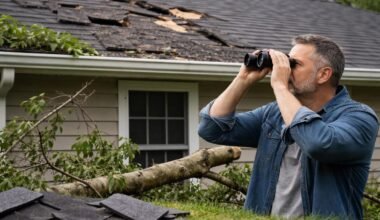Your home is your safe space, but what happens when something starts going wrong behind the scenes? Many issues around the house don’t show up with flashing signs or loud alarms. Instead, they sneak in quietly and slowly become serious problems. By the time you notice the damage, it might be costly, inconvenient, or even dangerous.
The good news is that your home usually gives you small clues that something’s off. You just have to know where to look. Whether it’s a strange sound, a weird smell, or a spike in your utility bills, learning how to read these signals can save you time, money, and a lot of stress.
Let’s walk through some of the most common hidden problems that homeowners tend to overlook. Catching them early can help you avoid bigger repairs down the line. And we’ll start with one of the most ignored signs that something might be wrong: an unusual smell.
Odd Smells Could Signal Trouble
Strange smells in your home are easy to brush off, especially if they come and go. But in many cases, those odors are trying to tell you something. They might signal issues with your heating system, plumbing, or even mold growth. Paying attention to new or persistent smells can help you catch problems before they get worse.
One common concern during colder months is an odd smell when your heating system kicks on. A slight dusty scent can be normal when you first use your heater for the season. However, if the odor smells like a burning plastic, sulfur, rotten eggs, or musty mold, it could point to more serious issues. These smells might come from electrical problems, gas leaks, or mold inside your ducts.
If you’ve noticed a smell coming from furnace, don’t ignore it. The cause could range from dirty burners to overheated components or even something stuck in the vents. Some of these issues are harmless, but others could be dangerous if left unchecked. A professional inspection can help you figure out the source and fix it before it becomes a major health or safety risk.
Unexplained Increases in Utility Bills
It’s normal for your energy or water bills to go up slightly with seasonal changes. But if you see a sudden jump and can’t figure out why, it’s worth investigating. An increase in electricity could mean your HVAC system is working harder than it should. Higher water bills might point to a hidden leak under a sink or behind a wall.
Tracking your utility bills from month to month can help you spot unusual changes. If something doesn’t add up, it might be time to call in a plumber or HVAC technician. Catching a problem early, like a dripping pipe or clogged air filter, can prevent bigger headaches later.
Cracks, Warps, or Stains on Walls and Ceilings
You might see a small crack on a wall and assume it’s just the house settling. And sometimes, that’s all it is. But if cracks start growing, appear diagonally, or come with other issues like doors sticking or floors sloping, they could indicate foundation trouble.
Stains on ceilings or bubbling paint usually point to water problems. Maybe there’s a roof leak, or perhaps a pipe is dripping behind the wall. It’s tempting to paint over these flaws, but that won’t fix the real issue. If you notice signs like these, it’s best to get them checked out before water damage spreads or structural problems worsen.
Strange Noises from Plumbing, Walls, or Appliances
Every house has its own set of sounds, but some noises are signs of trouble. If you hear banging in the pipes when you turn off a faucet, it could be a water hammer. If your fridge or HVAC unit is making buzzing or grinding noises, it might be a failing motor or loose part.
Tapping sounds inside the walls could even point to pests or plumbing issues. If something doesn’t sound right, don’t just turn up the TV to drown it out. Listen closely, take note of where and when the noise happens, and call in a professional if it continues.
Doors and Windows That Suddenly Stick or Won’t Close
Have you ever had a door that used to open easily but now sticks or won’t latch? That might be a sign of moisture damage or foundation movement. Similarly, if your windows become harder to open or close, you might be dealing with swelling wood, poor insulation, or shifting frames.
These changes can be frustrating, but they’re also important clues. Check for signs of water damage near the frames or along the floor. If the issue is widespread, you may need a contractor to evaluate the structure of your home and make necessary repairs before more doors or windows are affected.
Pests That Keep Coming Back
A few ants or the occasional spider might not raise any red flags. But if you’re constantly dealing with pests, something bigger might be going on. Insects and rodents are drawn to warm, damp, and hidden places. Their presence could mean that your home has cracks, leaks, or rotting wood that you can’t see.
If you’ve already tried sprays, traps, or professional extermination and the pests still come back, it’s time to look deeper. You may need to fix the underlying issue, whether it’s sealing up entry points, drying out damp areas, or replacing damaged materials to keep them from returning.
Mold or Mildew in Unexpected Places
Mold isn’t always easy to spot, especially when it grows in corners, behind furniture, or inside cabinets. You might first notice it by smell, a musty odor that doesn’t go away even after cleaning. Mold can cause allergy symptoms, respiratory issues, and even damage to walls and furniture if left unchecked.
Pay special attention to high-moisture areas like bathrooms, basements, and kitchens. If you spot discoloration on walls or ceilings, or if your family starts experiencing unexplained sniffles or coughing, it’s worth having your home checked for mold. Professional removal is usually the safest way to ensure it doesn’t come back.
When to Bring in the Pros
You don’t need to be a home expert to spot problems, but knowing when to get help is key. If you’ve tried basic fixes and issues still come back, or you’re unsure what’s causing a problem, it’s best to call in a professional.
Home inspectors, electricians, plumbers, and HVAC technicians are trained to spot what you might miss. They can diagnose the issue, recommend the right solution, and make sure repairs are done safely and correctly. Spending a little on an inspection now can save you a lot more in the future by avoiding major repairs or replacements.
Your home is full of systems working behind the scenes to keep you safe, comfortable, and warm. When something feels “off,” it’s usually because your house is trying to tell you that something needs attention. Ignoring the signs, whether it’s a weird smell, rising bills, or stubborn windows, only gives the problem time to grow.



